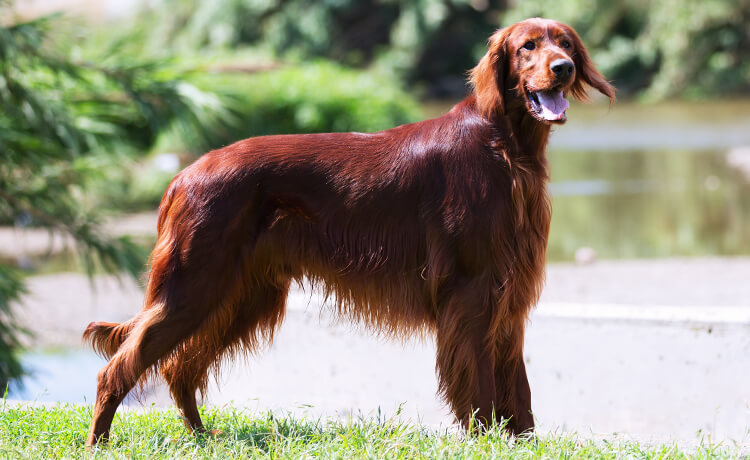
Chesapeake Bay Retriever
The Chesapeake Bay Retriever, often referred to as the Chessie, is a powerful, intelligent, and resilient dog breed known for its exceptional retrieving skills, especially in water. Originating in the United States, the breed was developed to retrieve waterfowl in the challenging, icy waters of the Chesapeake Bay. With its unwavering loyalty and strong work ethic, the Chesapeake Bay Retriever makes a wonderful companion for experienced and active dog owners.
1. Appearance
- Size: Chessies are medium to large-sized dogs. Males typically stand 23 to 26 inches tall and weigh between 65 to 80 pounds, while females stand 21 to 24 inches and weigh 55 to 70 pounds.
- Coat: The breed's distinctive coat is dense and waterproof, featuring a slightly oily texture that helps repel water. It is usually wavy on the shoulders and back and comes in shades of brown, sedge, or deadgrass.
- Build: The Chesapeake Bay Retriever has a muscular, athletic build with a deep chest and strong legs, making it well-suited for swimming and retrieving in difficult conditions.
- Expression: Chessies have a keen and alert expression, highlighted by their bright eyes, which can range in color from yellowish to amber.
2. Temperament
- Loyal and Protective: Chesapeake Bay Retrievers are known for their deep loyalty to their families. They often develop a strong bond with their primary caretaker and may exhibit protective behaviors.
- Intelligent and Independent: While highly intelligent, Chessies can be independent and even stubborn at times. They respond well to training but require consistency and firmness.
- Affectionate Yet Reserved: While affectionate with their families, they may be reserved or aloof with strangers, making them natural watchdogs.
- Playful and Energetic: This breed is known for its playful nature, especially when it comes to activities that involve water or retrieving.
3. Health
- Life Expectancy: Chesapeake Bay Retrievers have an average lifespan of 10 to 13 years.
-
Common Health Issues:
- Hip Dysplasia: A common concern in larger breeds, hip dysplasia can affect Chessies.
- Progressive Retinal Atrophy (PRA): This genetic condition can lead to vision loss over time.
- Hypothyroidism: Some Chessies may develop thyroid issues.
- Bloat (Gastric Dilatation-Volvulus): As deep-chested dogs, Chessies can be susceptible to this life-threatening condition.
- General Care: Regular vet check-ups, a balanced diet, and routine health screenings can help prevent or manage potential issues.
4. Care and Grooming
Essentials for Your Newly Adopted Pet
Welcoming a shelter pet into your life is a beautiful journey. Here are some handpicked items to help your new friend feel safe, loved, and right at home:
- Grooming Needs: The Chessie’s waterproof coat requires minimal grooming. Weekly brushing helps remove loose hair and keep the coat in good condition, while baths should be infrequent to maintain the coat’s natural oils.
- Ear Care: Given their love of water, it’s essential to check and dry their ears after swimming to prevent infections.
- Nail and Dental Care: Routine nail trims and dental hygiene are important to maintain their overall health.
5. Training and Exercise
- Exercise Requirements: Chesapeake Bay Retrievers are high-energy dogs that require ample daily exercise. Activities like swimming, retrieving games, and long walks are ideal for keeping them mentally and physically stimulated.
- Training Tips: Early training and socialization are crucial to channel their intelligence and energy positively. Chessies thrive with a confident handler who can provide structured training and set clear boundaries.
- Mental Stimulation: Incorporating puzzle toys, advanced obedience training, or scent work can help keep their minds engaged.
6. Best Environment
- Living Situation: Chessies do best in homes with plenty of space to roam and access to outdoor areas for exercise. They are not well-suited for apartment living unless their exercise needs are thoroughly met.
- Family Compatibility: They are affectionate and good with children, but their boisterous nature may be overwhelming for very young kids. Proper supervision and training can ensure safe interactions.
- Active Owners: Ideal for families or individuals who lead active lifestyles and enjoy outdoor activities, particularly those involving water.
Conclusion
The Chesapeake Bay Retriever is a loyal, intelligent, and hardworking breed perfect for those who appreciate a dog with a strong spirit and an inherent love of the outdoors. While they can be independent and protective, with proper training and ample exercise, they make devoted and affectionate companions. For owners ready to meet their needs, Chessies offer unwavering loyalty and joy.
Affiliate Products
Up to 75% Discount

Dog Collar with Health Monitoring
BUY NOW »
Up to 55% Discount

Luxury Faux Furhuge Napping Bed
BUY NOW »

